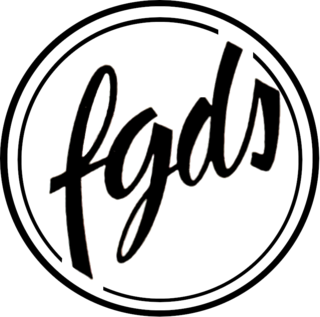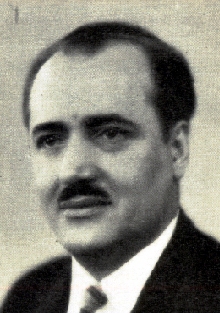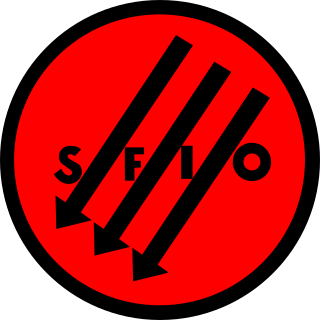
The French Fourth Republic was the republican government of France from 27 October 1946 to 4 October 1958, governed by the fourth republican constitution of 13 October 1946. It was in many ways a revival of the Third Republic, which governed from 1870 during the Franco-Prussian War to 1940 during World War II, and it suffered many of the same problems.

The Radical Party, officially the Republican, Radical and Radical-Socialist Party, is a liberal and social-liberal political party in France. Since 1971, to prevent confusion with the Radical Party of the Left (PRG), it has also been referred to as Parti radical valoisien, after its headquarters on the rue de Valois. The party's name has been variously abbreviated to PRRRS, Rad, PR and PRV. Founded in 1901, the PR is the oldest active political party in France.

The Rally of the French People was a French political party, led by Charles de Gaulle.

The Popular Republican Movement was a Christian-democratic political party in France during the Fourth Republic. Its base was the Catholic vote and its leaders included Georges Bidault, Robert Schuman, Paul Coste-Floret, Pierre-Henri Teitgen and Pierre Pflimlin. It played a major role in forming governing coalitions, in emphasizing compromise and the middle ground, and in protecting against a return to extremism and political violence. It played an even more central role in foreign policy, having charge of the Foreign Office for ten years and launching plans for the creation of the European Coal and Steel Community, which grew into the European Union. Its voter base gradually dwindled in the 1950s and it had little power by 1954.

Presidential elections were held in France on 5 December 1965, with a second round on 19 December. They were the first direct presidential elections in the Fifth Republic and the first since the Second Republic in 1848. It had been widely expected that incumbent president Charles de Gaulle would be re-elected, but the election was notable for the unexpectedly strong performance of his left-wing challenger François Mitterrand.

The Provisional Government of the French Republic was the provisional government of Free France between 3 June 1944 and 27 October 1946, following the liberation of continental France after Operations Overlord and Dragoon, and lasting until the establishment of the French Fourth Republic. Its establishment marked the official restoration and re-establishment of a provisional French Republic, assuring continuity with the defunct French Third Republic.

Legislative elections were held in France on 4 and 11 March 1973, to elect the fifth National Assembly of the Fifth Republic.

The Federation of the Democratic and Socialist Left was a conglomerate of French left-wing non-Communist forces. It was founded to support François Mitterrand's candidature at the 1965 presidential election and to counterbalance the Communist preponderance over the French left.
The Democratic and Socialist Union of the Resistance was a French political party founded after the liberation of France from German occupation, mainly active during the Fourth Republic (1947–58). It was a loosely organised "cadre party" without mass membership. Its ideology was vague, including a broad diversity of different political convictions, and it was variously described as left-wing, centrist, and even conservative. It was decidedly anti-communist and linked with the Paix et Liberté movement. The UDSR was a founding member of the Liberal International in 1947.
The Rally of Republican Lefts was an electoral alliance during the French Fourth Republic composed of the Radical Party, the Independent Radicals, the Democratic and Socialist Union of the Resistance (UDSR) and several conservative groups. Headed by Jean-Paul David, founder of the anti-Communist movement Paix et Liberté, it was in fact a right-of-center conservative coalition, which presented candidates to the June 1946, November 1946, and 1951 legislative elections.
Tripartisme was the mode of government in France from 1944 to 1947, when the country was ruled by a three-party alliance of communists, socialists and Christian democrats, represented by the French Communist Party (PCF), the French Section of the Workers' International (SFIO) and the Popular Republican Movement (MRP), respectively. The official charter of tripartisme was signed on 23 January 1946, following the resignation of Charles de Gaulle, who opposed the draft of the constitution. The draft envisioned a parliamentary system, whereas de Gaulle favored a presidential system.
Legislative elections were held in France on 10 November 1946 to elect the first National Assembly of the Fourth Republic. The electoral system used was proportional representation.
Legislative elections were held in France on 17 June 1951 to elect the second National Assembly of the Fourth Republic.

Legislative elections were held in France on 21 October 1945 to elect a Constituent Assembly to draft a constitution for a Fourth French Republic. A total of 522 seats were elected through proportional representation; women were allowed to vote for the first time.

A constitutional referendum was held in France on 5 May 1946. Voters were asked whether they approved of a new draft Constitution proposed by the Constituent Assembly elected in 1945.

The Socialist Party is a French centre-left and social-democratic political party. It holds pro-European views. The PS was for decades the largest party of the "French Left" and used to be one of the two major political parties in the French Fifth Republic, along with The Republicans. It replaced the earlier French Section of the Workers' International in 1969 and is currently led by First Secretary Olivier Faure. The PS is a member of the Party of European Socialists, Progressive Alliance and Socialist International.

The Left in France The distinction between left and right wings in politics derives from the seating arrangements which began during the Assemblee Nationale in 1789. During the 1800s, left largely meant support for the Republic, whereas right largely meant support for the monarchy.

The French Communist Party has been a part of the political scene in France since 1920, peaking in strength around the end of World War II. It originated when a majority of members resigned from the socialist French Section of the Workers' International (SFIO) party to set up the French Section of the Communist International (SFIC). The SFIO had been divided over support for French participation in World War I and over whether to join the Communist International (Comintern). The new SFIC defined itself as revolutionary and democratic centralist. Ludovic-Oscar Frossard was its first secretary-general, and Ho Chi Minh was also among the founders. Frossard himself resigned in 1923, and the 1920s saw a number of splits within the party over relations with other left-wing parties and over adherence to the Communist International's dictates. The party gained representation in the French parliament in successive elections, but also promoted strike action and opposed colonialism. Pierre Semard, leader from 1924 to 1928, sought party unity and alliances with other parties; but leaders including Maurice Thorez imposed a Stalinist line from the late 1920s, leading to loss of membership through splits and expulsions, and reduced electoral success. With the rise of Fascism this policy shifted after 1934, and the PCF supported the Popular Front, which came to power under Léon Blum in 1936. The party helped to secure French support for the Second Spanish Republic during the Spanish Civil War and opposed the 1938 Munich Agreement with Hitler. During this period the PCF adopted a more patriotic image, and favoured an equal but distinct role for women in the communist movement.

Augustin Laurent was a French coal miner, journalist and socialist politician. He was a national deputy both before and after World War II (1939–45). During the war he was active in the French Resistance. After the liberation of France he was Minister of Posts, Telegraphs, and Telephones in the provisional government between September 1944 and June 1945. He was active as a socialist in the post-war legislature until 1951, when he decided to focus on local politics. He was mayor of Lille from 1955 to 1973.

The French Section of the Workers' International was a political party in France that was founded in 1905 and succeeded in 1969 by the modern-day Socialist Party. The SFIO was founded during the 1905 Globe Congress in Paris as a merger between the French Socialist Party and the Socialist Party of France in order to create the French section of the Second International, designated as the party of the workers' movement.













